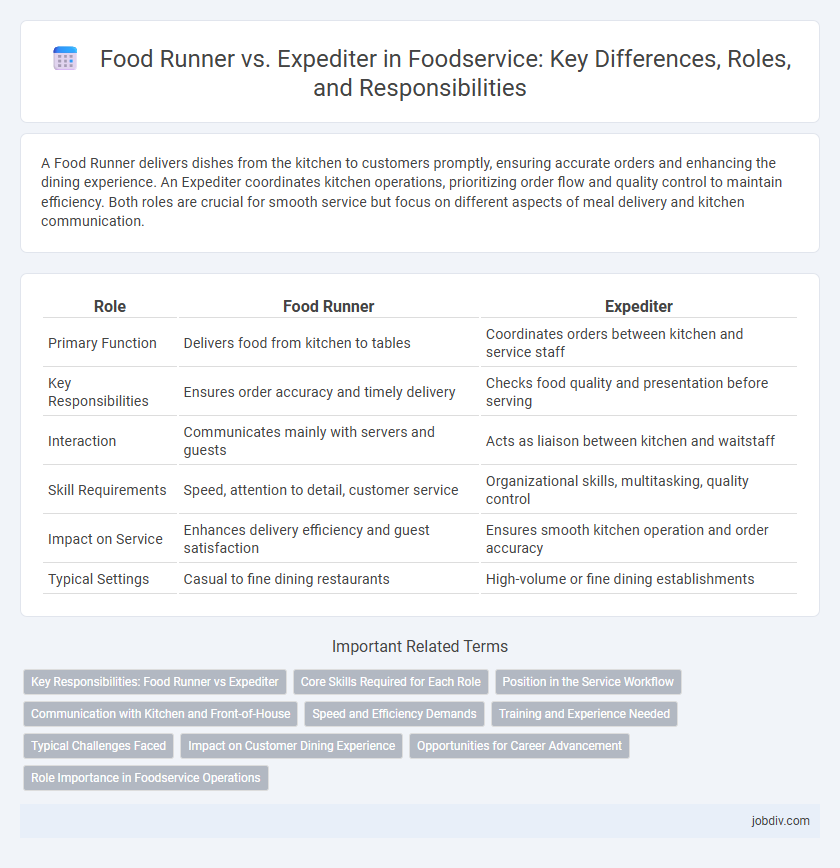A Food Runner delivers dishes from the kitchen to customers promptly, ensuring accurate orders and enhancing the dining experience. An Expediter coordinates kitchen operations, prioritizing order flow and quality control to maintain efficiency. Both roles are crucial for smooth service but focus on different aspects of meal delivery and kitchen communication.
Table of Comparison
| Role | Food Runner | Expediter |
|---|---|---|
| Primary Function | Delivers food from kitchen to tables | Coordinates orders between kitchen and service staff |
| Key Responsibilities | Ensures order accuracy and timely delivery | Checks food quality and presentation before serving |
| Interaction | Communicates mainly with servers and guests | Acts as liaison between kitchen and waitstaff |
| Skill Requirements | Speed, attention to detail, customer service | Organizational skills, multitasking, quality control |
| Impact on Service | Enhances delivery efficiency and guest satisfaction | Ensures smooth kitchen operation and order accuracy |
| Typical Settings | Casual to fine dining restaurants | High-volume or fine dining establishments |
Key Responsibilities: Food Runner vs Expediter
Food Runners primarily focus on delivering prepared dishes promptly from the kitchen to customers, ensuring correct orders and assisting servers by clearing tables when needed. Expediters coordinate communication between kitchen staff and servers, manage food quality checks, and ensure timely plating and presentation to enhance overall service efficiency. Both roles are essential in maintaining smooth restaurant operations but differ in scope, with Expediters overseeing the flow and quality control, while Food Runners handle delivery and basic table maintenance.
Core Skills Required for Each Role
Food runners require strong communication skills and quick multitasking abilities to efficiently deliver orders and respond to customer needs, ensuring smooth service flow. Expedite specialists need exceptional organizational skills and attention to detail to coordinate between kitchen staff and servers, verifying order accuracy and timely presentation. Both roles demand a proactive attitude and a deep understanding of menu items to optimize overall dining experience.
Position in the Service Workflow
The food runner operates primarily in the front-of-house service area, delivering dishes from the kitchen to customers promptly to ensure timely and accurate orders. The expediter works closely within the kitchen, coordinating between chefs and servers to manage the flow of food preparation and presentation, ensuring each plate meets quality and sequence standards. Both roles are critical in streamlining the service workflow, with the food runner focused on delivery efficiency and the expediter on order accuracy and timing.
Communication with Kitchen and Front-of-House
Food Runners act as vital links between the kitchen and front-of-house, ensuring timely delivery of dishes while communicating order status and special requests to maintain accuracy. Expediter roles focus on coordinating the flow of food from kitchen to servers by prioritizing orders, checking plate presentation, and managing communication to prevent delays. Effective communication in both roles enhances operational efficiency and improves overall guest satisfaction in high-volume foodservice environments.
Speed and Efficiency Demands
Food runners focus on swiftly delivering prepared dishes from the kitchen to guests, ensuring timely service that enhances table turnover. Expediter roles emphasize coordinating communication between kitchen staff and servers, streamlining order flow to reduce errors and delays. High-demand foodservice environments rely on both positions to maximize speed and operational efficiency during peak hours.
Training and Experience Needed
Food runners typically require basic training focused on efficient order delivery and customer interaction, often gained on the job with minimal prior experience. Expediter roles demand more advanced training in kitchen operations, menu knowledge, and communication skills to coordinate between chefs and servers effectively. Experienced expediters often have prior experience as food runners or servers, enabling them to manage timing and quality control in high-volume foodservice environments.
Typical Challenges Faced
Food runners often face challenges such as timely delivery of dishes amidst a fast-paced environment, maintaining food quality and presentation during transit, and coordinating effectively with both kitchen staff and servers. Expediter roles typically encounter difficulties in managing order accuracy, prioritizing multiple orders simultaneously, and ensuring smooth communication between chefs and front-of-house teams. Both positions demand exceptional multitasking skills and the ability to quickly resolve issues to maintain efficient service flow.
Impact on Customer Dining Experience
A Food Runner ensures timely delivery of dishes from the kitchen to the table, directly influencing the temperature and presentation of the food, which enhances customer satisfaction. An Expediter oversees the accurate and efficient coordination of order preparation and plating, reducing wait times and minimizing errors that can negatively affect the dining experience. Both roles are crucial in maintaining a seamless flow of service, ultimately improving overall guest perception and repeat visits.
Opportunities for Career Advancement
Food Runners and Expediters both play crucial roles in the foodservice industry, with Expediters often positioned closer to management, offering greater opportunities for leadership development and career advancement. Food Runners can leverage their hands-on experience and knowledge of kitchen operations to transition into Expediter roles, which involve coordinating communication between kitchen staff and servers for efficient service flow. Advancing to roles such as Shift Supervisor or Restaurant Manager is more accessible for those who master the organizational and multitasking skills required of an Expediter.
Role Importance in Foodservice Operations
Food Runners and Expediters play crucial roles in streamlining foodservice operations by ensuring timely and accurate delivery of dishes from the kitchen to the dining area. Food Runners enhance customer satisfaction through efficient service and attention to detail, while Expediters coordinate with kitchen staff to manage order flow and maintain quality control. Their combined efforts reduce wait times, improve communication between front and back of house, and drive overall operational efficiency in busy restaurant environments.
Food Runner vs Expediter Infographic

 jobdiv.com
jobdiv.com